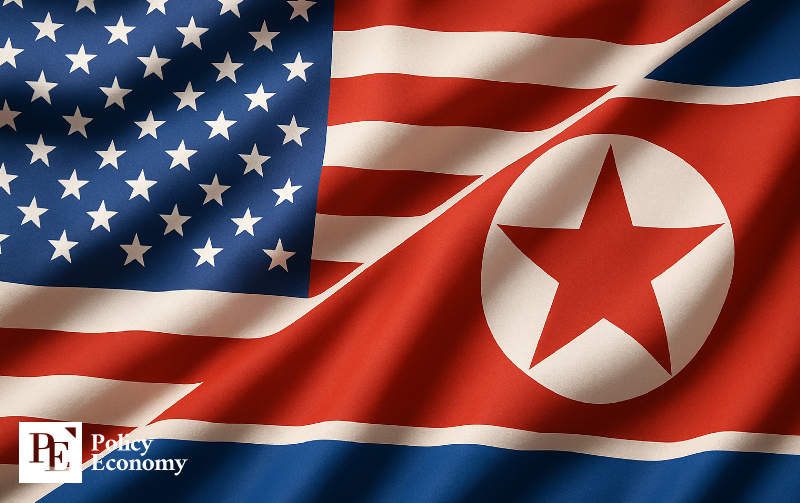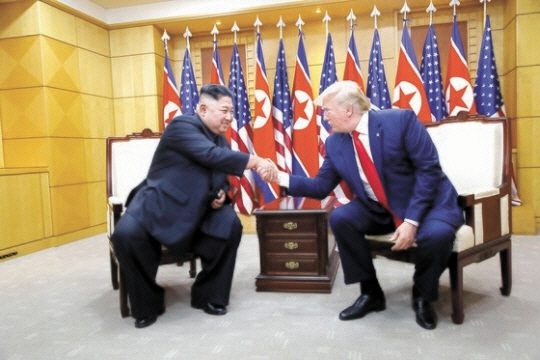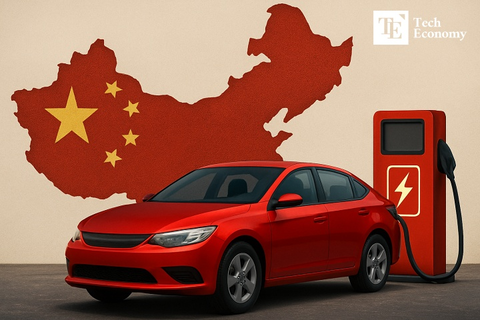Trump Sends Love Call to Kim Jong-un — Is U.S.–North Korea Dialogue Season 2 Beginning?
Input
Changed
"North Korea Refused to Receive Letter Trump Tried to Send" White House Does Not Deny NK News Report Spokesperson LaCivita: "Trump Wants to See Progress Like in His First Term"

Just four months into Donald Trump’s second presidential term, concrete signs have emerged that his administration is trying to resume dialogue with North Korea. Trump appears to be engaging in “letter diplomacy” with North Korean leader Kim Jong-un, raising speculation that the stalled U.S.–North Korea talks may be reignited.
White House: "President Open to Letter Exchanges"
On June 11 (local time), White House spokesperson Caroline Leavitt said, “President Trump wants to see progress with North Korea similar to what was achieved during the first U.S.–North Korea summit in Singapore in 2018.” At a briefing, she stated, “President Trump remains receptive to exchanging letters with Chairman Kim,” though she declined to comment on any specific correspondence, leaving that for the president to address.
Her remarks came in response to a report by NK News, which stated that North Korean diplomats at the UN in New York had refused to accept a personal letter from Trump addressed to Kim. According to the outlet, Trump has written a letter aimed at restarting talks, reminiscent of those held during his first term. Despite repeated attempts, the North Korean side reportedly refused to receive the letter.
Leavitt did not deny the report, effectively confirming Trump’s openness to direct engagement. This suggests that Trump is still interested in a top-down diplomatic approach toward North Korea, relying on personal dialogue with Kim. Back in April, Trump had hinted at renewed contact with North Korea, saying, “At some point, something will happen regarding North Korea.” Axios also reported that the Trump administration had been consulting with internal and external experts about potentially resuming talks.

Resumption of U.S.–North Korea Letter Diplomacy?
During his first term, Trump broke the ice with Kim through an exchange of letters. Between 2018 and 2019, the two reportedly exchanged over 20 personal letters. At the time, foreign media even joked the two leaders “fell in love” through their correspondence. The letters led to the first U.S.–North Korea summit on June 12, 2018, in Singapore, where the two sides agreed on building a peace regime on the Korean Peninsula, working toward complete denuclearization, and repatriating war remains. However, a lack of concrete action plans on denuclearization eventually stalled the process.
The second summit in Hanoi on February 27–28, 2019, ended without agreement due to sharp differences over the scope of denuclearization and sanctions relief. Despite the breakdown, the two continued exchanging letters, including birthday greetings, which set the stage for a third, brief meeting at the Korean Demilitarized Zone in June 2019. Follow-up working-level talks resumed afterward but failed to make meaningful progress.
Trump’s Strategy: Engage with North Korea to Help Resolve the Ukraine War
Diplomatic experts speculate that Trump may be reaching out to Kim as part of a broader strategy to influence the war in Ukraine. North Korea has been supplying arms and personnel to Russia, making it a key ally. By engaging Pyongyang, Trump may be attempting to isolate Moscow. Professor Hwang Il-do of Korea’s National Diplomatic Academy commented, “While North Korea isn’t Trump’s top priority, he may try to separate North Korea from the Ukraine conflict to weaken Russia’s position.” Restoring communication channels early in his term could help counter the Russia–North Korea alliance, he added.
Some analysts believe Trump’s move may also stem from his personal desire for attention. Trump has fondly recalled the intense global spotlight during his summits with Kim, once calling them the most media-covered moments of his life. Other theories suggest Trump might be eyeing long-term goals like checking China’s regional influence or possibly involving U.S. businesses in developing North Korea’s coastal resorts.
While another summit isn’t out of the question, many observers doubt it will lead to significant breakthroughs. NK News reported that North Korean diplomats refused to accept Trump’s letter, likely under Kim’s direct orders—a reflection of Pyongyang's reluctance. Kim remains firmly opposed to Western demands for denuclearization, while Trump’s administration continues to view denuclearization as its central policy on the Korean Peninsula.
North Korea still remembers being pressured in 2019 to dismantle all nuclear facilities, after proposing to only shut down its Yongbyon complex in exchange for sanctions relief. Given the current close ties between Pyongyang and Moscow, North Korea may see little benefit in reopening talks with the U.S. at this time.
Still, experts caution against assuming North Korea will remain unresponsive. Despite deepening ties with Russia and China and accelerating nuclear weapons development, Kim may see strategic value in engaging with Trump—a U.S. president who has acknowledged him as a legitimate counterpart.





















